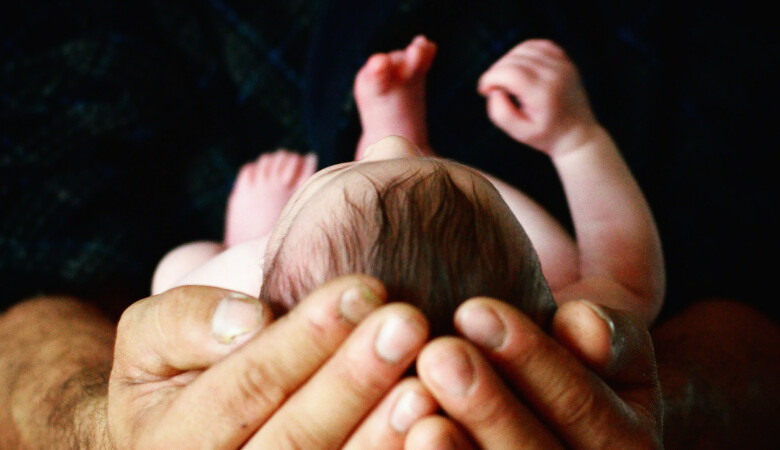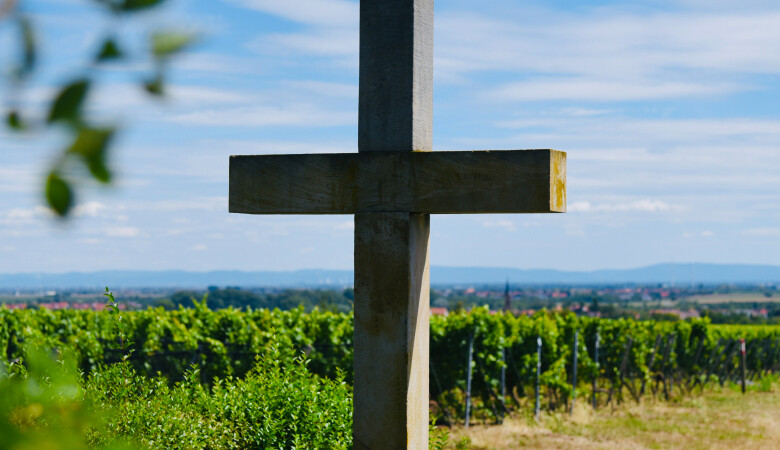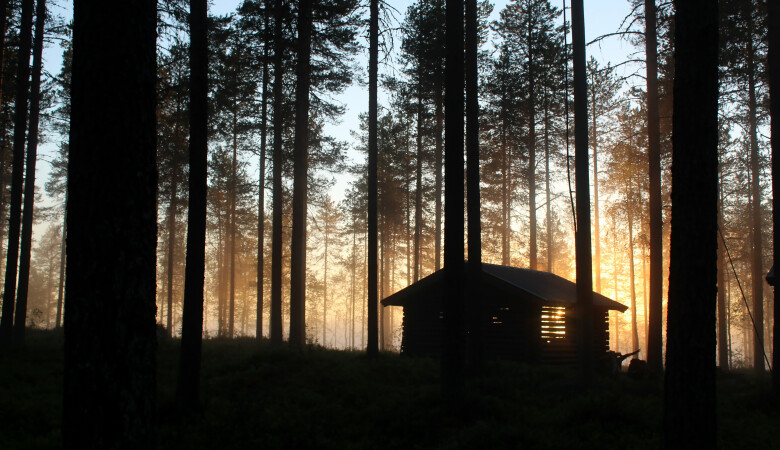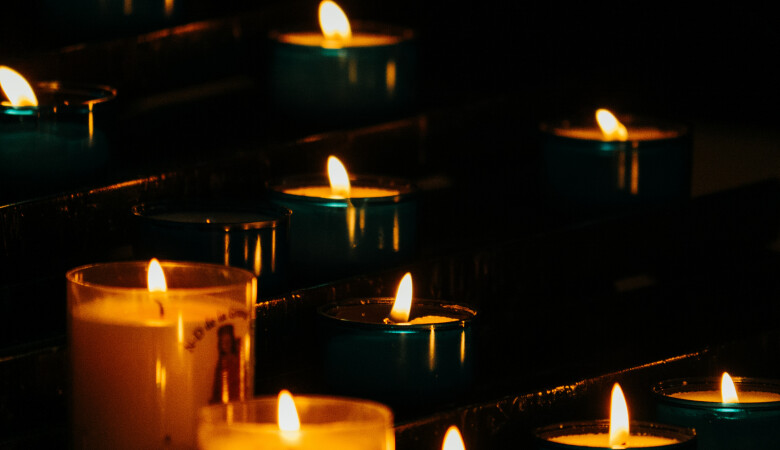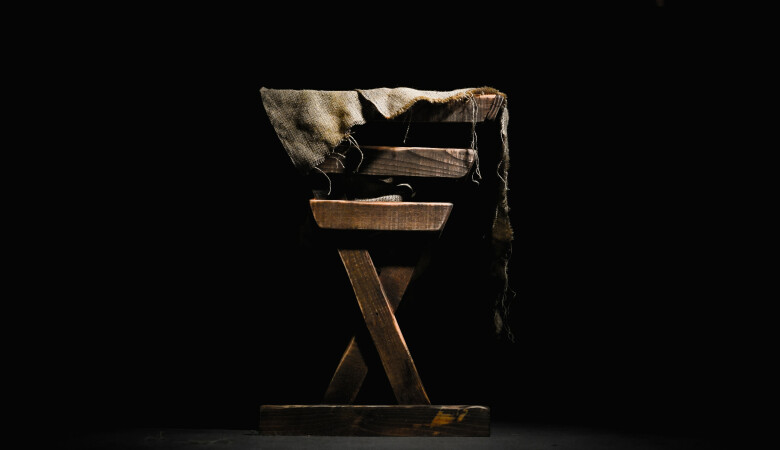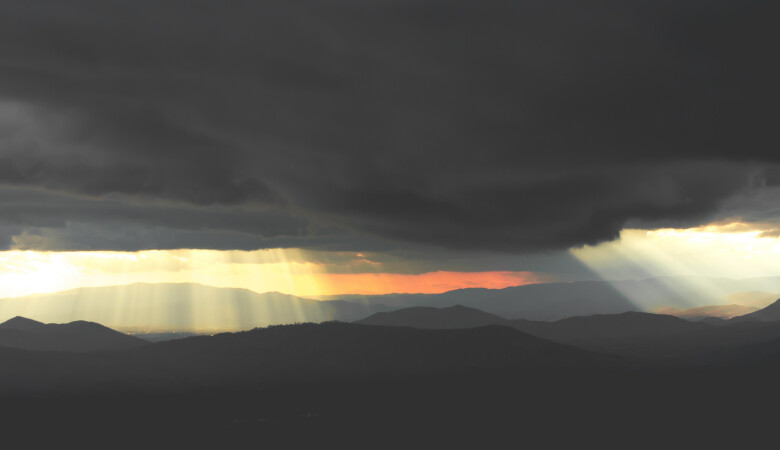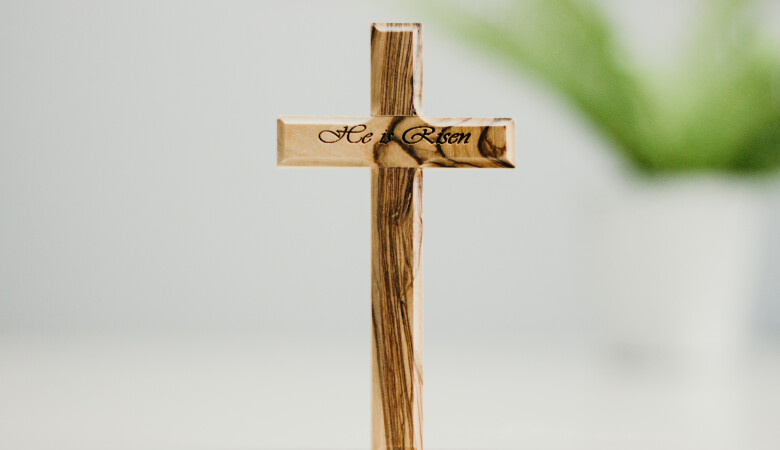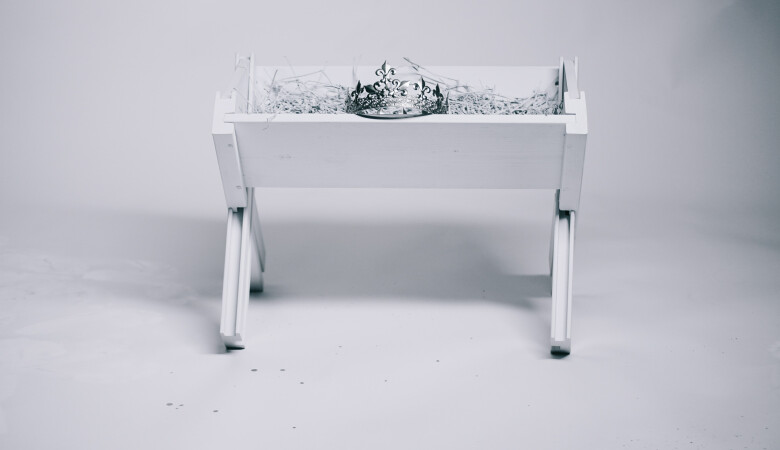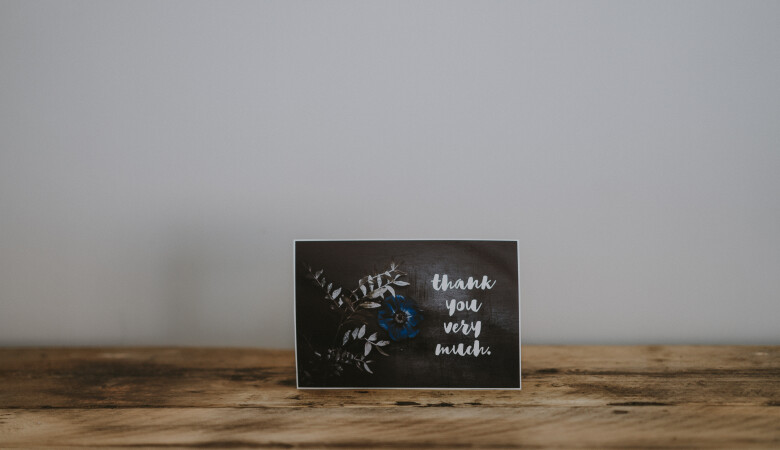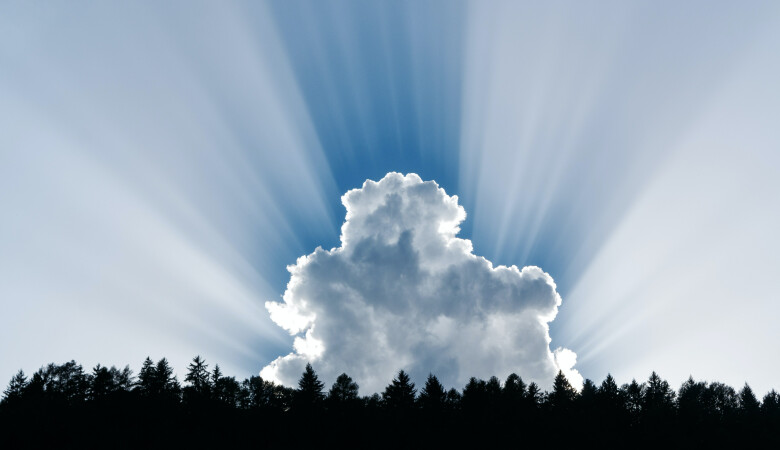Series: Christmas Season
Brought Near by Christmas
December 24, 2023 | Andy Davis
Ephesians 2:13
Redemption, Glory of God, Heaven
Jesus Christ left heaven to enter this sin-cursed world as a human being to open the doorway back into the presence of God.
- SERMON TRANSCRIPT -
This fall I was visiting my family, the part of my family that lives up in Boston and my daughter Carolyn, and I went to the Boston Museum of Fine Arts. In one of the galleries there we saw a painting that just arrested me and seized my imagination and caused me to ponder for a long time. The painting was entitled, Expulsion from the Garden of Eden, and it was painted by Thomas Cole. It's a dramatic scene, of course, depicting the most tragic event in human history. Adam and Eve's sin in the Garden of Eden leading to God's curse on them and on the world and the judicial sentence of death descending on them. God then righteously expelled them from the Garden of Eden and put a guardian cherub with a flaming sword flashing back and forth to guard the way into the Garden lest any of them or their descendants should eat from the Tree of lLife.
Thomas Cole, who painted that painting was an ardent evangelical Christian who lived in the first third of the 19th century, and he painted this masterpiece in the year 1828. Cole was a founder of the Hudson River School of Landscape Painting. He dearly loved the pristine beauty of nature all over the world, but especially in his home area of the Catskill Mountains in upstate New York. Cole's painting of the expulsion of Adam and Eve from the Garden of Eden is basically divided in half. The right half of the painting is the beautiful Garden of Eden with clear blue skies, fair weather, clouds, stunningly beautiful snow cap, mountains in the distance and alluring lake in the valley between the mountains, lush greenery, abundant with colorful flowers in the foreground, paradise lost. The left half of the painting is bleak with dark colors of volcano erupting lava in the distance, flashes of lightning coming from the ominous storm clouds, a straggly apparently dead tree dominating the foreground with apparently dead animals at the foot of that tree.
Adam and Eve themselves are tiny, barely noticeable as they hurry from the Garden of Eden into the dark dying world that their sin destroyed. They hurry into that cursed world across a stone bridge that spans a deep chasm shrouded in darkness. The waters of a flood seem to be hurdling down the chasm toward them. Between the brilliantly light right side of the painting and the dark left side is a passageway, like a doorway made of stone, like the entrance it seems to a cave. In the center of that doorway, brilliant light emanates with overpowering rays. Those rays perhaps represent the glory of God chasing the two sinners from paradise, or perhaps the flaming sword in the hands of the guardian cherub ready to kill them if they should try to double back. It is of the expulsion from the presence of God and of this brilliantly lit passageway back into the presence of God that I want to speak tonight. It was in order to open this doorway back into the presence of God that Jesus Christ left heaven and entered this sin curse world as a human being.
My texts tonight are Ephesians 2:13 and Hebrews 10:19-22. Hear them again, Ephesians 2:13 says, "But now in Christ Jesus, you who once were far away have been brought near through the blood of Christ." And again, Hebrews 10:19-22, "Therefore, brothers, since we have confidence to enter the most Holy place by the blood of Jesus, by a new and living way opened for us through the curtain that is his body. And since we have a great priest over the house of God, let us draw near to God with a sincere heart in full assurance of faith, having our heart sprinkled to cleanse us from a guilty conscience and having our bodies washed with pure water.”
I. Expelled From Eden
First expelled from Eden, Adam and Eve were created perfect by God in the image of God and placed in that perfect world in which everything had been declared very good by God. Adam was formed first from the dust of the earth and put in the Garden of Eden to serve and protect it. Adam was clearly commanded by God, you are free to eat from any tree in the garden, but you must not eat from the Tree of the Knowledge of Good and Evil for when you eat of it, you'll surely die. This freedom to eat from any tree in Eden was evidence of the lavish generosity and love of God. The fruit was varied, it was delicious, it was nourishing. The prohibition to eat from the Tree of the Knowledge of Good and Evil was evidence of the holiness of God and his absolute sovereignty, his right to put limits and boundaries to our freedoms. It is also more evidence of his love because He knew perfectly well what unleashing evil into the history of the world would do. Tragically, we all have an increasing sense of what happened.
Eve was deceived by the serpent and was lured to eat from the forbidden fruit. She gave some to her silent and passive husband who was with her and who utterly failed to protect his wife, his unborn children, and the Garden of Eden, indeed the entire world from the devastating effects of the serpents lies. They both ate. Their eyes were open to their nakedness, they were stripped of the glory that they had been given by God and they began to hide from each other and from God. God confronted Adam and condemned him for his sin. They both came under instant spiritual death and would live the rest of their lives under a temporarily deferred but absolutely certain death penalty.
As Thomas Cole depicted, the whole world fell into the dark curse of decay and death because of Adam's sin. Adam and Eve were expelled from the presence of God as Genesis 3, tells us. The Lord God banished him from the Garden of Eden to work the ground from which he had been taken. After He drove the man out, He placed on the east side of the garden of Eden cherubim and a flaming sword flashing back and forth to guard the way to the Tree of Life.
II. Distant From God
The infinite loss that day was to be driven not only from the beautiful Garden of Eden, but from the glorious presence of a loving and Holy God, distant from God. The Bible reveals that all of us are naturally distant from God because of our sin. Psalm 138:6 says, "Though the Lord is on high, he looks upon the lowly, but the proud he knows from afar." From afar. Also, Proverbs 15:29 says, “The Lord is far from the wicked.” This is relational language because we know the Bible teaches that God is omnipresent."
It says in Acts 17, He is not far from each one of us, "For in him we live and move and have our being." But the Holy God is infinitely far from wickedness and evil corruption and sin from darkness itself. Habakkuk 1:13 says, "Your eyes are too pure to look on evil. You cannot tolerate wrong." Our text in Ephesians speaks of the immeasurable distance between us as unconverted people and this Holy God. Ephesians 2 says, "Remember that at that time you separate from Christ excluded from citizenship in Israel and foreigners to the covenants of the promise without hope and without God in the world." And it says in the next verse, "You who were once far away." A picture of this distance between a Holy God and a sinful people was established in the Tabernacle and then later the Temple of the Old Covenant.
The lessons of the Old Covenant may be summed up in the first command that God gave to Moses at the burning bush. In Exodus 3:5 God said to him, "Do not come any closer. Do not come any closer." Then he said, "Take off your sandals for the place where you're standing is Holy ground." Again and again, the Holy God has been saying to sinful humanity, “do not come any closer.” Before He descended in fire on Mount Sinai, the Lord commanded Moses to erect a barrier, a fence line around the base of the Holy mountain so that no one could ascend that mountain because God would have to kill them. The Tabernacle represented God's desire to dwell in the midst of a sinful people, but it was made of curtains that represented barriers between a Holy God and a sinful people. We are not welcome, “this far you may come and no farther.” So as sinners, we were distant from God.
"The Tabernacle represented God's desire to dwell in the midst of a sinful people, but it was made of curtains that represented barriers between a Holy God and a sinful people. We are not welcome, “this far you may come and no farther.” So as sinners, we were distant from God."
III. Christ Has Drawn Near To Us
Third, Christ has drawn near to us. Christ has drawn near to us. In the incarnation of Jesus Christ, this Holy God has drawn near to us. “Emanuel,” which we sang about this morning and again tonight means “God with us.” God gave his only-begotten Son a body with blood so that a doorway could be open into his presence by means of that body and that blood. The incarnation means “the Word became flesh” with a literal human body. But why? What was the reason? The reason was to bring sinners near to a Holy God by the blood and by the body of Jesus. Listen again to Ephesians 2:13, "But now in Christ Jesus, you who once were far away have been brought near through the blood of Christ." Again, Hebrews 10, "Therefore brothers, since we have confidence to enter the most Holy place by the blood of Jesus by a new and living way open for us through the curtain that is his body. And since we have a great priest over the house of God, let us draw near to God with a sincere heart and full assurance of faith, having our heart sprinkled to cleanse us from the guilty conscience and having our bodies washed with pure water."
The incarnation means that God, the Son, took on a body with blood so that the death penalty we deserve for our sins could be paid in full. By the baby, wrapped in swaddling clothes and laid in the manger, we are brought near to a Holy God.
IV. Christ Has Brought Us Near To God
Christ, fourthly, has brought us near, so therefore, let us draw near. By faith in Christ we who were on the outside excluded, exiled, banished, cast out, evicted from the paradise of God's glorious presence by faith in the blood of Christ shed on the cross, we have been brought near. That is exactly what Ephesians 2:13 tells us. If you have trusted in Christ, you have been brought near positionally and for all eternity to God, one with Christ by faith in Christ, by faith. Speaking of nearness to God, Ephesians 2:13 tells us we have been brought near once for all into the presence of God, into the Holy of Holies, into the throne room of God, into a reconciled relationship with God.
"By faith in Christ we who were on the outside excluded, exiled, banished, cast out, evicted from the paradise of God's glorious presence by faith in the blood of Christ shed on the cross, we have been brought near."
But Hebrews 10, exhorts “Let us draw near to God.” So the one is positional and can never change. The other is experiential, relational by faith in Christ, drawing near to God in relational closeness, in a sense of intimacy with a loving God. So draw near brothers and sisters, let us draw near by faith. Let us have our bodies washed with the pure water of the Word. Let us have our hearts sprinkled from a guilty conscience. Sense that you are dearly loved. Draw near, draw near to a Holy God, draw near by Jesus's work, draw near by immersing your mind in Scripture as it testifies to Jesus. Draw near by prayer, confessing your sins with confidence of a perfect cleansing. Draw near by repentance and by the power of a changed life through the Holy Spirit. Draw near, the author to Hebrews tells us in full assurance of faith that God dearly loves you. He cannot love you more and will never love you less.
Draw near now through the ordinance of the Lord's Supper, recognizing by faith, the body and the blood of Christ in these elements, symbolically, yes, but by faith recognizing that the incarnation came so that we who are far away might draw near.
Close with me, this time of meditation in the Word with prayer, and then we'll turn to the Lord's Supper.
Father, we thank you for the amazing truths of the Word of God. We can never plumb their deaths. We can never fully understand these themes. We can never fully understand what it meant to be expelled, to be exiled, to be aliens, to be distant from you and to fully understand in this world what it means now in Christ to be brought in here. Help us to understand these things by faith in your Word. And now as we have the opportunity to partake in the Lord's Supper, bless this time. In Jesus' name, Amen.
We're going to partake in the Lord's Supper. We have an unusual way on Christmas Eve of celebrating it. These tables just set up and whereas ordinarily at the Lord's Supper, we send deacons out with the elements and pass them through the pews and you stay where you are. On Christmas Eve we invite you to draw near and to stand around the tables. And so what we do is we just have people come and stand and as the table is reasonably full, then we serve those people and then those folks go and sit down and the next group comes up. We would ask that only people who have testified, who have come to personal faith in Christ and testified to that by baptism, partake. If not, we ask that you refrain. But this is a time for us to enjoy the Lord's Supper.
And so I'm going to read the words of institution and then we will celebrate in groups around the tables. Hear now what the Lord said, "For I receive from the Lord what I also passed on to you." The Lord Jesus on the night he was betrayed, took bread. And when he had given thanks, he broke it and said, "This is my body, which is for you, do this in remembrance of me." In the same way after supper, he took the cup saying, "This is the cup. This cup is the new covenant in my blood. Do this whenever you drink it in remembrance of me. For whenever you eat this bread and drink this cup, you proclaim the Lord's death until he comes."
Now, let us pray. Father, we thank you now for the opportunity that we have to draw near through the body and blood of Christ and to partake by faith in this symbolism of your life, of your death, and also of your resurrection. We pray that you'd bless it now and add the blessing by the power of the Spirit through faith in the Word. In Jesus' name, Amen.


